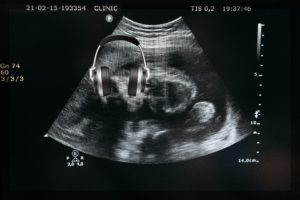Have you ever heard of parents putting headphones on their bellies during pregnancy so their baby can listen to music before they’re born? That’s because babies usually start being able to hear during the third trimester. We also know that babies start to develop language at a very young age, and as more research is being conducted, they are quickly proving to be anything but passive listeners. It turns out that while they are in the womb, fetuses approaching their birthdays can absorb and learn some parts of language and use what they learned to form preferences once they are born!
There are several studies demonstrating the fascinating ability of babies to learn language skills in utero. First, an important study done by DeCasper and Spence (1986) showed that sounds fetuses were exposed to during their third trimester influenced what babies preferred to listen to later on. They had pregnant mothers read Dr.Seuss’s Cat & the Hat or 2 other similar stories out loud twice daily for a month. Then, following the birth of the infants, they were split into two categories: 1) hear Cat & the Hat (target story) or 2) hear another story (novel story). To measure which story they preferred, the researchers measured how long the infants would suck on a special kind of pacifier, that measures “sucking rate” (it’s a real thing!). If they are familiar with it, they will suck less, indicating that they are bored, and if the audio is unfamiliar, they will suck more. DeCasper and Spence found that the infants preferred hearing the familiar story over the novel story and also that newborns preferred their mothers’ voices (which they’d been hearing basically ‘underwater’ for awhile) over other women’s voices, no matter which story they read. Overall, this conclusion highlights how third trimester fetuses had learned something about the acoustic cues which were specific to the particular story and their mother’s voice.

Another study by Partanen (2013) investigated how babies can store memories and patterns in their brains related to auditory learning before they are born. In their study, they gave pregnant women a recording to play several times a week during their last few months of pregnancy, which included a made-up word, “tatata,” repeated many times. After they were born, the infants were tested using EEG sensors to see if their brains would respond to the made-up word as if it were familiar to them. When they were tested, the infants’ brains recognized the word and its variations, while infants who didn’t hear the made-up word during pregnancy did not show the same brain response. Additionally, babies who had heard the recordings also recognized sound changes in the made up word, and the more their mothers had played the recording, the more their brains responded to these changes, which means their experience before birth mattered a lot for their language processing after they were born!
An additional interesting study by Gervain (2018) looked at how infants can learn very specific information from the audio that they hear in the womb (things like pitch, intonation, intensity, melody, rhythm, etc.) and use this information to help them develop their language skills after they are born. This specific information, also known as prosody or prosodic patterns, can help infants advance their native language and develop skills like grammar and syntax, but it can also help them distinguish patterns in foreign languages, find language inconsistencies, and much more.
In all, the results of these studies and countless others suggest that language development starts in utero and contributes to infant language learning post-birth. Infants are the best language learners, and discovering how they absorb information can give important insight on lifelong and developmental learning.
References
DeCasper, A. J., & Spence, M. J. (1986). Prenatal maternal speech influences newborns’ perception of speech sounds. Infant Behavior and Development, 9(2), 133–150. https://doi.org/10.1016/0163-6383(86)90025-1
Gervain, J. (2018). The role of prenatal experience in language development. Current Opinion in Behavioral Sciences, 21, 62–67. https://doi.org/10.1016/j.cobeha.2018.02.004
Partanen, E., Kujala, T., Näätänen, R., Liitola, A., Sambeth, A., & Huotilainen, M. (2013). Learning-induced neural plasticity of speech processing before birth. Proceedings of the National Academy of Sciences, 110(37), 15145–15150. https://doi.org/10.1073/pnas.1302159110

Serena Raj
Author
Serena Raj is a sophomore at Duke who is majoring in Psychology with a double minor in Biolgy and Chemistry on the pre-med track. She is interested in language acquisition in infants and more specifically how a child’s environment can impact their neural development and linguistic abilities!
Elika Bergelson
PRincipal Investigator